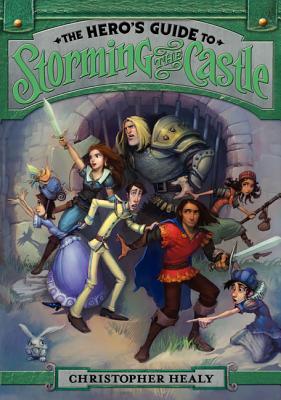You may have seen me posting on
Twitter or
Facebook in the last couple of days about my current read,
Nothing Can Possibly Go Wrong. (And if you haven't, well than clearly you're not stalking me hard enough...)
Either way, I am currently reading and loving this, which makes me super-geeked to welcome Prudence Shen, one of the awesome minds behind the book! (The other being Faith Erin Hicks, who brought her awesome art style to the story -
you may remember me fangirling a bit over her art when I read Friends with Boys...)
Prudence is going to chat with us about her unexpected road to the publication of
Nothing Can Possibly Go Wrong, and soon I'm going to chat with you about why I think you should pick it up! And in between (aka at the end of this post) First Second Books is giving you a chance to win a copy!
So many exclamation points!
!!
Somewhere on my computer hard drive is the beginnings of a profoundly terrible spec script for
Leverage.
In case you've never seen the show, firstly, you should, and secondly, you should know it's about a bunch of thieves and con men who decide to
leverage their particular skill sets to help people getting screwed by corporate America and other sundry villains. One of my best friends is an adept and fabulous storyteller and a screenwriter by preferred trade; she also once had an episode that convinced her I could be taught to ride that particular rodeo bronco.
The act of writing a script is the art of having sufficient emotional detachment to let other people dabble in the flawless brilliance of your idea. No matter how bad your writing actually is, like Kiera Knightly in
Love Actually, to you, your story is perfect. My attempt at writing a script for
Leverage was so hilariously neurotic, I had roughly two scenes, maybe three dialog exchanges, and the rest of the 20-odd pages were scene descriptions. My friend, after seeing this, had to admit defeat, and pleased with my incompetence, I put the spec to bed. Forever.
Letting other people get their fingers into your universe is a fraught and emotionally complex experience, and handing off my novel -- then a prose manuscript titled
Voted Most Likely -- to be adapted into a graphic novel was hard. This was literal years ago, before we'd identified an artist for the comic and just after my agent had called me to explain First Second's interest, their plans. I remember standing in the sweeping hallway of my then-office on my cell phone feeling like a fist had closed over my windpipe.

Was I happy? Of course. I'd scammed someone into buying my book! Was this good news? Obviously,
ibid. Did I want to move forward? Saying no to this sort of opportunity is ridiculous.
Even then, my visual imagination was filling in blanks: the story that eventually became
Nothing Can Possibly Go Wrong was always an active, farcical romp through suburbia. There were robot battles and basketball games, it would make for a fun story to
look at in addition to a fun story to read.
But there's a big different in the academic exercise of imagining someone taking a pass at your story and actually having it happen.
I think it's a common experience of every writer to want to track down their bad reviewers, their readers who got it wrong, and to explain themselves, to point out this passage or that imagery and say, "See? Do you get it now?
Hey, stop running away this is important!" That's as constant as the rate of gravity or my ability to be attracted to the biggest douchebag in any given group of people, and it gnawed at me as First Second talked about which adapters they were reaching out to, after we lucked out with Faith's marvelously funny art, as we waited for the condensed plot, the script, the graphic novel pages.
There was a lot of nail biting and anxiety on my end, fretting over what someone would do with my novel. Would they understand the essential melancholy at the heart of Charlie? Would they be able to depict it in images the way I hoped I'd managed to get it across in words? What about Nate, and his bombastic pursuit of his goals -- would that come off as grudgingly charming, or completely obnoxious?
But it boils down to trusting that your story got the message across, or some piece of that message. I fully believe that once you've dotted your last I and crossed your last T, the author is dead, and all your protestations otherwise are futile. Everybody brings their own experiences and biases to their media consumption, and everybody's version of a novel is different. One time I met a guy who thought
The Scarlet Letter was about puritanical views on adultery;
obviously that book is about rendering supernatural the concept of female agency. Despite what your high school English teachers may have written in the margins of your more creative (read: desperate) papers, both interpretations are true -- not because it's what Hawthorne wanted us to get out of the novel, but it's what we actually took away.
Lucky for Faith, by the time she was fully on board and we were looking at the adaptation, I'd talked myself off the ledge, fever breaking with a simple realization:
It is incredibly cool to see another person's interpretation of your work.
We may love our writing, but we can only ever know it in a vacuum. It's very improbable that someone will delve into its characters, its plots with anything like the thoughtfulness and time that went into its creation. As
Voted Most Likely was transmogrified into
Nothing Can Possibly Go Wrong, I was one of the rare, lucky ones to see what was most enduring about the story. It turned out to be some stuff I expected (one liners! robots!) and some things I didn't (the quietness of Nate and Charlie's friendship, their very understated support of one another). It was a privilege to know what had resonated with Faith, what had been hidden between the lines.
So was it nerve-wracking to have the novel adapted to a comic? Immensely. But it was hugely interesting and very cool, too. Plus, since I wasn't the one giving myself carpal tunnel drawing battlebot scenes, it was only upside for me.
I hope you like the book; I hope you like Faith's wonderful drawings and very cool interpretations of the characters. But far more than any of that, I hope you read it so you can get your
own take, so that -- sometime very soon -- I will be seized with anxiety that someone is
getting it wrong and not even know why.
ABOUT THE BOOK:
Nothing Can Possibly Go Wrong by Prudence Shen & Faith Erin Hicks
Get It |
Add It
Contemporary/Graphic Novel, 288 pages
Expected publication: May 7th 2013 by First Second
You wouldn’t expect Nate and Charlie to be friends. Charlie’s the laid-back captain of the basketball team, and Nate is the neurotic, scheming president of the robotics club. But they are friends, however unlikely—until Nate declares war on the cheerleaders. At stake is funding that will either cover a robotics competition or new cheerleading uniforms—but not both.
It's only going to get worse: after both parties are stripped of their funding on grounds of abominable misbehavior, Nate enrolls the club's robot in a battlebot competition in a desperate bid for prize money. Bad sportsmanship? Sure. Chainsaws? Why not. Running away from home on Thanksgiving to illicitly enter a televised robot death match? Of course!
In Faith Erin Hicks' and Prudence Shen's world of high school class warfare and robot death matches, Nothing can possibly go wrong.
****GIVEAWAY****
The awesome folks* at First Second Books have offered up a copy of
Nothing Can Possibly Go Wrong to one lucky winner from the US, CAN or the UK! To enter, fill out the Rafflecopter below. Giveaway ends May 14th, 2013 at 12am EST.
PLEASE do not leave any sensitive info or email addresses in the comments - these entries will be deleted!
Good luck, and don't forget to leave some love for Pru & Faith!!
*aka Gina - thanks, Gina!
a Rafflecopter giveaway
 On the last FFO: The recently released covers for Jay Kristoff's Kinslayer went head to head, and while the opinions on its predecessor, Stormdancer, were more split, we all generally found the UK/AUS cover to be a little insipid and just not quite there this time around (whereas Jason Chan's artwork is as fab as ever); the US version won in a rare unanimous decision.
On the last FFO: The recently released covers for Jay Kristoff's Kinslayer went head to head, and while the opinions on its predecessor, Stormdancer, were more split, we all generally found the UK/AUS cover to be a little insipid and just not quite there this time around (whereas Jason Chan's artwork is as fab as ever); the US version won in a rare unanimous decision.








































